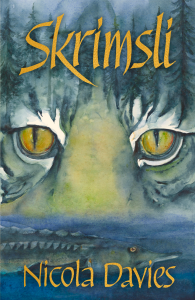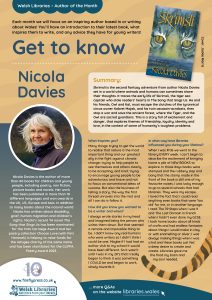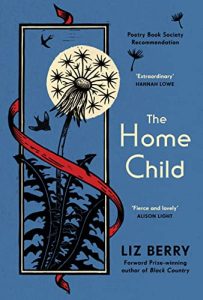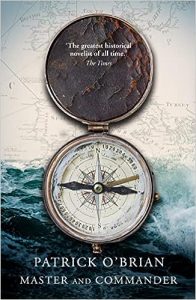Nicola Davies
August 1, 2023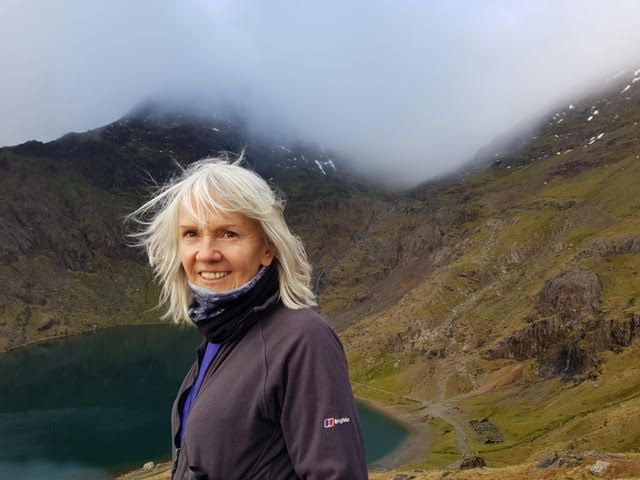
Skrimsli is the second fantasy adventure from the author, set in a world where animals and humans can sometimes share their thoughts. It traces the early life of Skrimsli, the tiger sea captain who stole readers’ hearts in The Song that Sings Us. He and his friends, Owl and Elo, must escape the clutches of the tyrannical circus owner Kobret Majak, and his twin assassin-acrobats, then stop a war and save the ancient forest, where the Tiger, and the Owl are sacred guardians.
Tell us a little about the story…
Skrimsli is at the heart of his own life story of course, but there are several other important characters whose lives and story line entwine with his. The first is the child who raises him after his mother dies. He’s called ‘Owl’ and is reviled in the circus as a ‘freak’. Owl and Skrimsli learn early on that they can share thoughts and have an over lapping mental space. The Master of the circus is a cruel and powerful man whose greed gets him tied up in an international plot to start a war in one country and steal oil and gold from another.
Characters from each of those threatened countries are drawn into the circus to try and find out more about who and what is driving the evil events in their own lands: one is the Queen of a desert nation, the other is the only witness to a massacre who has fled to avoid falling victim to the assassins who perpetrated it. As the scale of the plot, and the evil it could do become clearer, so the characters are drawn into an alliance to try to fight it.
So there’s lots of action – escapes and captures, fights and voyages, across the boundaries of several countries. But it is also a story about identity – about finding out who you really are, about being at peace with yourself and about the forces that drive a life forward, love and purpose.
What inspires you?
Many things: trying to get the world to realise that nature is the most important thing and our greatest ally in the fight against climate change; trying to help people to see themselves and others clearly, to be accepting, and kind; trying to encourage young people to be adventurous and brave and not to focus on conventional ideas of success. But also the business of telling a story, the way the first thread unravels into the mist and all I can do is follow it.
How did you know you wanted to be a writer and when?
I always wrote stories in my head and imagined being the person who writes them down. But that seemed a remote and impossible thing to be. I didn’t know any real humans who were writers so I didn’t think I could be one. Maybe if I had had an author visit to my school it would have been different. So it wasn’t until I was in my 20’s that I really began to think it was something I COULD be and began to work, slowly towards it.
Who are some writers you admire?
How long have you got? So I was raised on Keats and Longfellow, the poets my father loved and whose words he could recite. I adored Tolkien and read Lord of the Rings over and over and over. My mum bought me Thomas Hardy’s novels for my 16th birthday and I read them all obsessively. I have always read poetry and I think that’s shaped my writing. I loved Spike Milligan as a kid, but I had anthologies too and read lots of different poems. Ted Hughes’ poems about animals I come back to time and again.
I read lots of non-fiction now – for pleasure and research – and all sorts of different novels. Recent ones I’ve loved are by Barbara Kingsolver, Anthony Doer, Jonathan Franzen but my go to books for escape and comfort are a big series of historical novels by Patrick O’Brian… they are the books on which the film Master and Commander was based. I love everything about these beautifully written books but most of all the two main characters and their friendship.
What would be some advice you would give to your younger self?
Never stop drawing. Your mother is right, you should learn to play the guitar AND learn a language. You can learn anything.
What is your writing process?
I’m boringly disciplined! At my desk by 8.30 or 9 and there until I’ve done my 1,000 word quota, if I’m writing a novel or achieved some other milestone with picture book. Sometimes that’s OK…not too painful, sometimes its just a ghastly slog, and once in a long while it’s pleasurable. I re-write a great deal as I go along so that I have less to do when I’m finished, but my spelling even with spell check is SOOOOO dreadful that my poor editor tears out her hair.
What books are currently on your bedside table?
Re-reading a Patrick O’Brian, Master and Commander, Home Child by Liz Berry,
Otherlands by Thomas Halliday, Time on Rock by Anna Fleming.
In what way have libraries influenced you during your lifetime?
When I was little we went to the library EVERY week. I can’t begin to describe the excitement of bringing home a pile of NEW BOOKS to explore. In those days books were stamped and the rubbery slap and bang that the stamp made in the front of the book is still one of my favourite noises. I was lucky enough to go to several schools that had libraries. They were my escape. I loved the fact that I could read anything even books that were ‘too old’ for me, or in another language.
I read The 39 Steps when I was 9 and The Lost Domain in French when I hadn’t even done my GCSE. I took home books about all kinds of crafts and had endless fantasies about things I would make in clay, with enamelling or silver; I was always making things when I was a kid and these books just fed a deep desire to create and create. Libraries gave me the food my brain and my soul needed.
Do you have suggestions of how to encourage children and young people to read more for pleasure?
Read on your own terms. What you want, and when you want.
Give every book a chance – maybe 50 pages or a few chapters – but if it isn’t floating your boat by then, ditch it. No point reading something you don’t enjoy.
Keep trying…sometimes I have a run of books that have been recommended to me or I’ve read reviews of and HATE. It can put you off reading, but keep trying and before long you’ll find something that has you gobbling up the pages as if they were hot buttered toast.
Re-read. If you really LOVE a book indulge in the luxury of reading it again… or even reading the best bits over and over.
When I was in my 20s I used to worry that there were soooo many books and not enough time; now I think it’s better to read fewer things that you really love, that really speak to you, that really change you (yes, books can do that) than to just keep reading the next thing.
Talk about books with your friends. There are two great pleasures in books: reading and talking about reading.
What are your plans for future titles?
I ALWAYS have plans for future titles! There will be a third book in The Song that Sings Us / Skrimsli series. I won’t start writing it for a while but ideas have begun to gather. I have a story about a girl and a horse and her brother to write for Graffeg. I have a picture book about Sea horses to write and another sea-based one that I want to write and illustrate (I did that for the first time with my book LAST) and I have a sort of fairy story love story that I want to write and that my friend Jackie Morris wants to illustrate (if she ever has time)… oh and another poetry collection based on Petr Horacek’s art (we did one already that’s coming out this autumn The Star Whale). And did I mention the story about the Inuit who paddled round the world?

